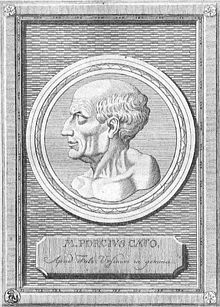Cato maior de senectute
Cato maior de senectute , in German Cato the Elder on Age , is a Latin philosophical dialogue by the Roman author Marcus Tullius Cicero . In it, Cicero lets the censor Marcus Porcius Cato the Elder († 149 BC) appear as the 83-year-old main character and present views on age . The work is dedicated to Cicero's friend and publisher Titus Pomponius Atticus .
content
Cato converses with Gaius Laelius Sapiens , the main character in Cicero's Laelius de amicitia , and Publius Cornelius Scipio Aemilianus Africanus , known as "the younger Scipio". The starting point of the conversation is that Laelius and Scipio are amazed at how miserably and painlessly Cato seems to endure his old age, while most of his peers tend to complain about the deterioration of their bodies and their prestige.
The allegations against age are four ( quattuor reperio causas, cur senectus misera videatur § 5, 15).
- It discourages deeds ( unam quod avocet a rebus gerendis )
- It make the body weak ( alteram quod corpus faciat infirmius )
- It robs you of almost all pleasures ( tertiam quod privet omnibus fere voluptatibus )
- It is not far from death ( quartam quod haud procol absit a morte ).
Cato refutes these allegations one after the other, referring to numerous ancient Roman personalities such as Quintus Maximus , the poet Ennius or Appius, and defends old age as a necessary and enjoyable life. His arguments are as follows.
- The deeds of old age are not characterized by strength, agility or speed ( non viribus aut velocitate aut celeritate ) but by foresight, authority and determination ( consilio auctoritate sententia ). For comparison, Cicero uses the activity of a helmsman who does not climb the masts or walk through the ship, but rather sits quietly on the rear deck while doing more important things than everyone else (§§ 7–8).
- Age is not the only thing that makes the body weak. Often weakness stems from an unreasonable lifestyle. In addition, you need less strength in old age. Nevertheless, it is important to strengthen the spirit through regular exercise ( exercitationes ingeni ) and thus to rule over one's own until the last breath and not to indulge in impermanence (§§ 9-11).
- Lust is contrary to the reasonable way of life. Hence it is not a loss, but a gift to be freed from it ( O praeclarum munus aetatis, siquidem id aufert a nobis, quod est in adulescentia vitiosissimum! ). He contrasts the joys of pleasure with the joys of intellectual activity, the cultivation of friendship and society (§§ 12-18), also the occupation with agriculture, a favorite subject of Cicero (§§ 15-16).
- The proximity to death is not only inherent in old age. Rather, the old man has already reached the age that the young man hopes to reach ( illegal vult diu vivere, hic diu vixit ). Death is also not to be feared, as it either completely wipes out the soul or leads to eternal life ( futurus aeternus ) (§§ 19-22).
The explanations are pervaded by excursions into the biographical and historical and therefore also have social and mental history value.
Fictionality
The dialogue is obviously fictitious and has almost no historical basis. Cato was chosen by Cicero as the main character because he enjoyed a posthumous, almost heroic veneration in Roman society of his time, "so that the scriptures receive all the greater authority through him" ( quo maiorem auctoritatem haberet oratio , § 3). Cato was known by the nickname "the Censor" and was famous for his strict moral standards. As a result, he was to a certain extent an ideal image of Roman virtues and thus suited to Cicero's intentions.
Trivia
- The historical Cato had a severe aversion to the incipient Greek influence in the Roman area, although he himself learned Greek in old age. Ciceros Cato, on the other hand, is characterized by many references to the Greeks and their outstanding personalities.
Editions, translations and commentary
- Cicero: Cato maior de senectute / Cato the Elder on old age , Latin / German, transl. and ed. by Harald Merklin, Reclam, Stuttgart 2011, ISBN 978-3-15-000803-4
- Cicero: Cato the Elder on old age. Laelius on friendship , Latin-German, ed. by Max Faltner, Artemis & Winkler, Düsseldorf ³1999.
- Jonathan GF Powell: Cato maior de senectute , Cambridge Univ. Press, Cambridge 1988. (Commentary)
- Jonathan GF Powell (ed.): M. Tvlli Ciceronis De re pvblica. De legibvs. Cato maior de senectvte. Laelivs de amicitia , Clarendon, Oxford 2006.
- Karl Simbeck (ed.): Marci Tulli Ciceronis Cato maior de senectvte liber , Teubner, Leipzig 1912.
literature
- Ulrich Kammer: Investigations into Cicero's picture by Cato Censorius , Frankfurt (Main) 1963.
- Aron Sjöblad: Metaphors Cicero lived by. The role of metaphor and simile in De senectute , Univ., Lund 2009.
- Hartmut Wulfram: Ex uno plures. Three studies on the posthumous personality image of Old Cato , Verl. Antike, Berlin 2009.
